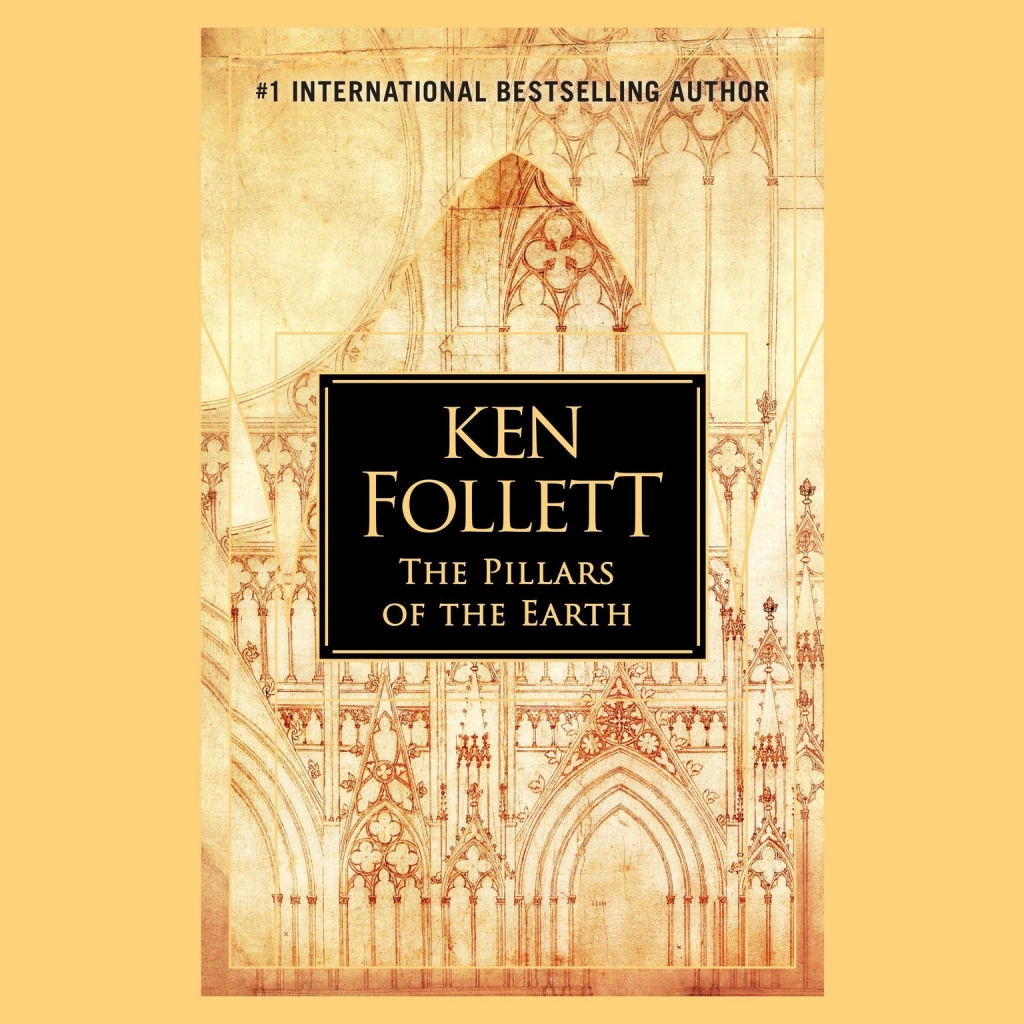 The Review:Ken Follet has delivered a captivating (fictional) look into the lives and times of cathedral builders during 1123 - 1174. I was actually happy to find out that he has written a sequel.Why did I enjoy this book so much? Why did I read it to distraction? Well, first there is the craft of writing; the author knows how to frame a large story with many characters and, yet keep it engaging and simple enough to follow. You are never lost, you always maintain a sense of the where, what, and why of the events that unfold.Then there is the author's research and knowledge that went into this book. I have always been fascinated with cathedrals and wondered about the informal histories of their builds, which would last decades through highly turbulent times. Reading this book about a fictional cathedral build (but based on many actual histories of builds) gets me as close as I can get without spending a historian-level effort to understand it.Equally, I think the author does a good job describing the impacts of the ever-changing balance between the local and regional powers and the brutal impunity endured by the defenseless a thousand years ago.As a third and final point I would like to add that the book offers an abundance of characters with whom it is possible to identify in one way or another. This made me feel as if some part of me was "in" the story.There are always quibbles. There are editorial slips, places where a certain cliched phrase is repeated too often and which could have been easily rectified. But more important for me is that the book has been made a bit too "reader-friendly", as if the author followed a "writing 101" workshop and applied all of the principles he learned there.The reader is offered a multitude of handholds and aide-memoirs to navigate this work, to the point that in some places it feels like the author is spoon-feeding not only vital plot points (there's a nice "writing 101" term for you), but also what the reader ought to feel about those.Also, while the main characters are easy to identify with, they are defined by a small number of uncomplicated motivations and behavioral traits which evolve, but very little over the decades that we follow them. Like fine wine, I expect my main protagonists (and antagonists for that matter) to develop over time, and their motivations that may have started so simple and pure when they were young to become more nuanced (muddled) as they get older.For an example on how this can be executed well (in a similar setting), consider Yourcenar's "L'Oeuvre au noir", or Haasse's "In a dark wood wandering".I could quibble more, but the fact is I really enjoyed the journey that the author took me on and I look forward to reading the next installment. *Read More Reviews By Sjors here
The Review:Ken Follet has delivered a captivating (fictional) look into the lives and times of cathedral builders during 1123 - 1174. I was actually happy to find out that he has written a sequel.Why did I enjoy this book so much? Why did I read it to distraction? Well, first there is the craft of writing; the author knows how to frame a large story with many characters and, yet keep it engaging and simple enough to follow. You are never lost, you always maintain a sense of the where, what, and why of the events that unfold.Then there is the author's research and knowledge that went into this book. I have always been fascinated with cathedrals and wondered about the informal histories of their builds, which would last decades through highly turbulent times. Reading this book about a fictional cathedral build (but based on many actual histories of builds) gets me as close as I can get without spending a historian-level effort to understand it.Equally, I think the author does a good job describing the impacts of the ever-changing balance between the local and regional powers and the brutal impunity endured by the defenseless a thousand years ago.As a third and final point I would like to add that the book offers an abundance of characters with whom it is possible to identify in one way or another. This made me feel as if some part of me was "in" the story.There are always quibbles. There are editorial slips, places where a certain cliched phrase is repeated too often and which could have been easily rectified. But more important for me is that the book has been made a bit too "reader-friendly", as if the author followed a "writing 101" workshop and applied all of the principles he learned there.The reader is offered a multitude of handholds and aide-memoirs to navigate this work, to the point that in some places it feels like the author is spoon-feeding not only vital plot points (there's a nice "writing 101" term for you), but also what the reader ought to feel about those.Also, while the main characters are easy to identify with, they are defined by a small number of uncomplicated motivations and behavioral traits which evolve, but very little over the decades that we follow them. Like fine wine, I expect my main protagonists (and antagonists for that matter) to develop over time, and their motivations that may have started so simple and pure when they were young to become more nuanced (muddled) as they get older.For an example on how this can be executed well (in a similar setting), consider Yourcenar's "L'Oeuvre au noir", or Haasse's "In a dark wood wandering".I could quibble more, but the fact is I really enjoyed the journey that the author took me on and I look forward to reading the next installment. *Read More Reviews By Sjors hereBook Review: The Pillars of The Earth- A Medieval Emotional Roller Coaster
23rd Oct, 2019 at 10:46AM
Set in medieval England, The Pillars of the Earth by Ken Follett is a gripping tale of the passions, intrigue, politics and greed surrounding the construction of a 12th century cathedral.The Run Down:It is the early 12th century and England is about to erupt into civil war. The new prior at the Kingsbridge monastery is determined to rebuild the current run down cathedral into one that will glorify God. He finds a young master builder who shares his vision of building the most beautiful cathedral in England.Unfortunately, the local bishop is a power hungry man with other plans. He works to disrupt the prior's efforts at every turn. His frequent ally in this is a cruel and vengeful earl consumed by his own greed. The Review:Ken Follet has delivered a captivating (fictional) look into the lives and times of cathedral builders during 1123 - 1174. I was actually happy to find out that he has written a sequel.Why did I enjoy this book so much? Why did I read it to distraction? Well, first there is the craft of writing; the author knows how to frame a large story with many characters and, yet keep it engaging and simple enough to follow. You are never lost, you always maintain a sense of the where, what, and why of the events that unfold.Then there is the author's research and knowledge that went into this book. I have always been fascinated with cathedrals and wondered about the informal histories of their builds, which would last decades through highly turbulent times. Reading this book about a fictional cathedral build (but based on many actual histories of builds) gets me as close as I can get without spending a historian-level effort to understand it.Equally, I think the author does a good job describing the impacts of the ever-changing balance between the local and regional powers and the brutal impunity endured by the defenseless a thousand years ago.As a third and final point I would like to add that the book offers an abundance of characters with whom it is possible to identify in one way or another. This made me feel as if some part of me was "in" the story.There are always quibbles. There are editorial slips, places where a certain cliched phrase is repeated too often and which could have been easily rectified. But more important for me is that the book has been made a bit too "reader-friendly", as if the author followed a "writing 101" workshop and applied all of the principles he learned there.The reader is offered a multitude of handholds and aide-memoirs to navigate this work, to the point that in some places it feels like the author is spoon-feeding not only vital plot points (there's a nice "writing 101" term for you), but also what the reader ought to feel about those.Also, while the main characters are easy to identify with, they are defined by a small number of uncomplicated motivations and behavioral traits which evolve, but very little over the decades that we follow them. Like fine wine, I expect my main protagonists (and antagonists for that matter) to develop over time, and their motivations that may have started so simple and pure when they were young to become more nuanced (muddled) as they get older.For an example on how this can be executed well (in a similar setting), consider Yourcenar's "L'Oeuvre au noir", or Haasse's "In a dark wood wandering".I could quibble more, but the fact is I really enjoyed the journey that the author took me on and I look forward to reading the next installment. *Read More Reviews By Sjors here
The Review:Ken Follet has delivered a captivating (fictional) look into the lives and times of cathedral builders during 1123 - 1174. I was actually happy to find out that he has written a sequel.Why did I enjoy this book so much? Why did I read it to distraction? Well, first there is the craft of writing; the author knows how to frame a large story with many characters and, yet keep it engaging and simple enough to follow. You are never lost, you always maintain a sense of the where, what, and why of the events that unfold.Then there is the author's research and knowledge that went into this book. I have always been fascinated with cathedrals and wondered about the informal histories of their builds, which would last decades through highly turbulent times. Reading this book about a fictional cathedral build (but based on many actual histories of builds) gets me as close as I can get without spending a historian-level effort to understand it.Equally, I think the author does a good job describing the impacts of the ever-changing balance between the local and regional powers and the brutal impunity endured by the defenseless a thousand years ago.As a third and final point I would like to add that the book offers an abundance of characters with whom it is possible to identify in one way or another. This made me feel as if some part of me was "in" the story.There are always quibbles. There are editorial slips, places where a certain cliched phrase is repeated too often and which could have been easily rectified. But more important for me is that the book has been made a bit too "reader-friendly", as if the author followed a "writing 101" workshop and applied all of the principles he learned there.The reader is offered a multitude of handholds and aide-memoirs to navigate this work, to the point that in some places it feels like the author is spoon-feeding not only vital plot points (there's a nice "writing 101" term for you), but also what the reader ought to feel about those.Also, while the main characters are easy to identify with, they are defined by a small number of uncomplicated motivations and behavioral traits which evolve, but very little over the decades that we follow them. Like fine wine, I expect my main protagonists (and antagonists for that matter) to develop over time, and their motivations that may have started so simple and pure when they were young to become more nuanced (muddled) as they get older.For an example on how this can be executed well (in a similar setting), consider Yourcenar's "L'Oeuvre au noir", or Haasse's "In a dark wood wandering".I could quibble more, but the fact is I really enjoyed the journey that the author took me on and I look forward to reading the next installment. *Read More Reviews By Sjors here
 The Review:Ken Follet has delivered a captivating (fictional) look into the lives and times of cathedral builders during 1123 - 1174. I was actually happy to find out that he has written a sequel.Why did I enjoy this book so much? Why did I read it to distraction? Well, first there is the craft of writing; the author knows how to frame a large story with many characters and, yet keep it engaging and simple enough to follow. You are never lost, you always maintain a sense of the where, what, and why of the events that unfold.Then there is the author's research and knowledge that went into this book. I have always been fascinated with cathedrals and wondered about the informal histories of their builds, which would last decades through highly turbulent times. Reading this book about a fictional cathedral build (but based on many actual histories of builds) gets me as close as I can get without spending a historian-level effort to understand it.Equally, I think the author does a good job describing the impacts of the ever-changing balance between the local and regional powers and the brutal impunity endured by the defenseless a thousand years ago.As a third and final point I would like to add that the book offers an abundance of characters with whom it is possible to identify in one way or another. This made me feel as if some part of me was "in" the story.There are always quibbles. There are editorial slips, places where a certain cliched phrase is repeated too often and which could have been easily rectified. But more important for me is that the book has been made a bit too "reader-friendly", as if the author followed a "writing 101" workshop and applied all of the principles he learned there.The reader is offered a multitude of handholds and aide-memoirs to navigate this work, to the point that in some places it feels like the author is spoon-feeding not only vital plot points (there's a nice "writing 101" term for you), but also what the reader ought to feel about those.Also, while the main characters are easy to identify with, they are defined by a small number of uncomplicated motivations and behavioral traits which evolve, but very little over the decades that we follow them. Like fine wine, I expect my main protagonists (and antagonists for that matter) to develop over time, and their motivations that may have started so simple and pure when they were young to become more nuanced (muddled) as they get older.For an example on how this can be executed well (in a similar setting), consider Yourcenar's "L'Oeuvre au noir", or Haasse's "In a dark wood wandering".I could quibble more, but the fact is I really enjoyed the journey that the author took me on and I look forward to reading the next installment. *Read More Reviews By Sjors here
The Review:Ken Follet has delivered a captivating (fictional) look into the lives and times of cathedral builders during 1123 - 1174. I was actually happy to find out that he has written a sequel.Why did I enjoy this book so much? Why did I read it to distraction? Well, first there is the craft of writing; the author knows how to frame a large story with many characters and, yet keep it engaging and simple enough to follow. You are never lost, you always maintain a sense of the where, what, and why of the events that unfold.Then there is the author's research and knowledge that went into this book. I have always been fascinated with cathedrals and wondered about the informal histories of their builds, which would last decades through highly turbulent times. Reading this book about a fictional cathedral build (but based on many actual histories of builds) gets me as close as I can get without spending a historian-level effort to understand it.Equally, I think the author does a good job describing the impacts of the ever-changing balance between the local and regional powers and the brutal impunity endured by the defenseless a thousand years ago.As a third and final point I would like to add that the book offers an abundance of characters with whom it is possible to identify in one way or another. This made me feel as if some part of me was "in" the story.There are always quibbles. There are editorial slips, places where a certain cliched phrase is repeated too often and which could have been easily rectified. But more important for me is that the book has been made a bit too "reader-friendly", as if the author followed a "writing 101" workshop and applied all of the principles he learned there.The reader is offered a multitude of handholds and aide-memoirs to navigate this work, to the point that in some places it feels like the author is spoon-feeding not only vital plot points (there's a nice "writing 101" term for you), but also what the reader ought to feel about those.Also, while the main characters are easy to identify with, they are defined by a small number of uncomplicated motivations and behavioral traits which evolve, but very little over the decades that we follow them. Like fine wine, I expect my main protagonists (and antagonists for that matter) to develop over time, and their motivations that may have started so simple and pure when they were young to become more nuanced (muddled) as they get older.For an example on how this can be executed well (in a similar setting), consider Yourcenar's "L'Oeuvre au noir", or Haasse's "In a dark wood wandering".I could quibble more, but the fact is I really enjoyed the journey that the author took me on and I look forward to reading the next installment. *Read More Reviews By Sjors here




